情态动词(完整整理版)
(完整版)情态动词must、can、could、may、might精解
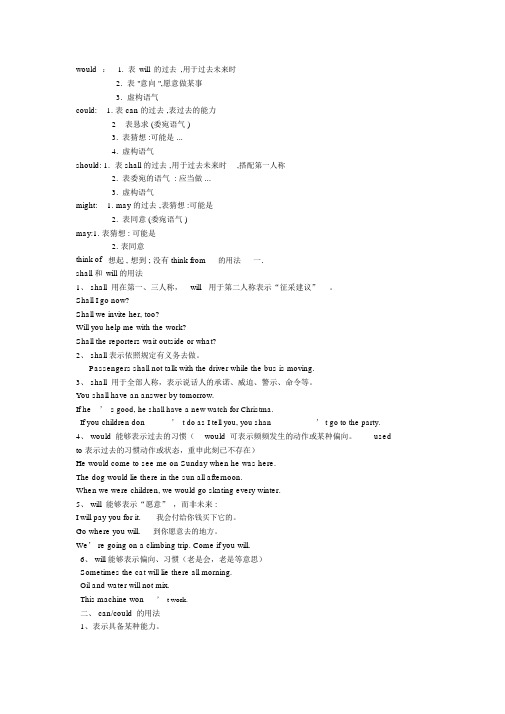
would: 1.表will的过去,用于过去未来时2.表 "意向 ",愿意做某事3.虚构语气could: 1. 表 can 的过去 ,表过去的能力2表恳求 (委宛语气 )3.表猜想 :可能是 ...4.虚构语气should: 1. 表 shall 的过去 ,用于过去未来时,搭配第一人称2.表委宛的语气 : 应当做 ...3.虚构语气might: 1. may 的过去 ,表猜想 :可能是2.表同意 (委宛语气 )may:1. 表猜想 : 可能是think of shall 和2. 表同意想起 , 想到 ; 没有 think fromwill 的用法的用法一.1、 shall 用在第一、三人称,will用于第二人称表示“征采建议”。
Shall I go now?Shall we invite her, too?Will you help me with the work?Shall the reporters wait outside or what?2、 shall 表示依照规定有义务去做。
Passengers shall not talk with the driver while the bus is moving.3、 shall 用于全部人称,表示说话人的承诺、威迫、警示、命令等。
You shall have an answer by tomorrow.If he’ s good, he shall have a new watch for Christma.If you children don’ t do as I tell you, you shan’ t go to the party. 4、 would 能够表示过去的习惯(would 可表示频频发生的动作或某种偏向。
used to 表示过去的习惯动作或状态,重申此刻已不存在)He would come to see me on Sunday when he was here.The dog would lie there in the sun all afternoon.When we were children, we would go skating every winter.5、 will 能够表示“愿意” ,而非未来 :I will pay you for it.我会付给你钱买下它的。
(完整版)初中英语情态动词用法大全,推荐文档

情态动词用法总结can 表示能力,意为“能会” 表示推测,意为“可能”,常用于否定句和疑问句中表示请求,允许,意为“可以”could can 的过去式,意为“能、会”,表示过去的能力在疑问句中表示委婉请求may 表示请求、许可,意为“可以” 表示推测,常用于肯定句中,意为“可能、也许”might may 的过去式表示推测,常用于肯定句中,意为“可能、也许must 表示主观看法,意为“必须、应该” 表示有把握的推测,用语肯定句need 表示需要、必须,主要用于否定句和疑问句中should 意为“应该”,表示要求和命令表示劝告、建议had better 意为“最好”,表示建议used to 意为“过去常常,表示过去的动作、行为知识梳理情态动词有具体的词义,但也同助动词一样,需要与其他词语一起构成句子的谓语,另外情态动词没有人称和数的变化,情态动词后必须跟动词原形。
考点一can ,may,must 等情态动词在陈述句中的用法1. can 的用法(1)表示能力、许可、可能性。
表示能力时一般译为“能、会”,即有种能力,尤其是生来具备的能力,此时may 和must 均不可代替它。
如:She can swim fast, but lean '她能游得很快,但我不能。
I can see with my eyes. 我用眼睛看。
(2)表示可能、能够。
如:l can finish it in an hour . 我能在一小时后完成它。
(3)表示许可,常在口语中。
如:You can use my dictionary. 你可以用我的字典。
(4)表示推测,意为可能” 常用于否定句和疑问句中,此时can'译为“不可能”女口:Can the news be true? 这个消息会是真的吗?--- C an it be our teacher?那个人有可能是我们老师吗?--- No , it can 't be outeracher. He is on a visit to the Great Wall. 不可能。
(完整版)情态动词归纳表.doc

情态动词归纳表情态 V词义&用法注意事项特殊用法can 1.表具某种能力Can 表在能力; Could 表示去能力 . could 可用 be able to 代替; was/were ableto to 表示成功做了某事2. 表求和允① 求用 could 气委婉②允不用could.3.表“可能性”①can 用于否定和疑句 (could 不限 )can (be) 表示有候会(常与②sometimes, at times 用)may 1. 表求和允① 求用 might 气更委婉。
might ②允用may ,表示“可以” (表示允不用might )。
2.表可能性“也”此意常用于肯定句。
( might 可能最小)3 表祝愿固定句型“ May+ 主 +V 原型”:May you succeed! ( 1 )表惊异、疑、不相信、不耐等。
(此意常用于否定句、疑句或惊句气) Can/Could this be true?(2 )can not ⋯too\enough 表示 "无怎 ``````也不分 "," 越``````越好 " : You can't be too careful.(1 )may/might well+V原形:表"完全可能 , ,很可能 "= be very likely to:He may well be proud for his son.(2 )may/might as well+V原形:" 最好,可以,倒不如"You may as well stay here over night.must 1.表“必”① must 多表主、在 / 将来 ;have to 多表客、去② mustn't 表 " 禁止 ";否定用 needn't/ don't have to2. 表推:“肯定只用于肯定句。
超级全的情态动词所有整理
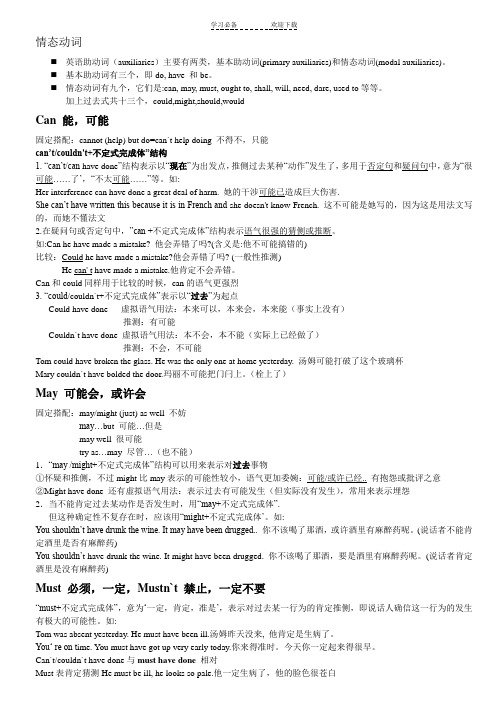
情态动词⏹英语助动词(auxiliaries)主要有两类,基本助动词(primary auxiliaries)和情态动词(modal auxiliaries)。
⏹基本助动词有三个,即do, have 和be。
⏹情态动词有九个,它们是:can, may, must, ought to, shall, will, need, dare, used to等等。
加上过去式共十三个,could,might,should,wouldCan 能,可能固定搭配:cannot (help) but do=can`t help doing 不得不,只能can’t/couldn't+不定式完成体”结构1. “can’t/can have done”结构表示以“现在”为出发点,推侧过去某种“动作”发生了,多用于否定句和疑问句中,意为“很可能……了’,“不太可能……”等。
如:Her interference can have done a great deal of harm. 她的干涉可能已造成巨大伤害.She can’t have written this because it is in French and she doesn't know French. 这不可能是她写的,因为这是用法文写的,而她不懂法文2.在疑问句或否定句中,”can +不定式完成体”结构表示语气很强的猜侧或推断。
如:Can he have made a mistake? 他会弄错了吗?(含义是:他不可能搞错的)比较:Could he have made a mistake?他会弄错了吗? (一般性推测)He can' t have made a mistake.他肯定不会弄错。
Can和could同样用于比较的时候,can的语气更强烈3. “could/couldn`t+不定式完成体”表示以“过去”为起点Could have done 虚拟语气用法:本来可以,本来会,本来能(事实上没有)推测:有可能Couldn`t have done 虚拟语气用法:本不会,本不能(实际上已经做了)推测:不会,不可能Tom could have broken the glass. He was the only one at home yesterday. 汤姆可能打破了这个玻璃杯Mary couldn`t have bolded the door.玛丽不可能把门闩上。
情态动词完整版
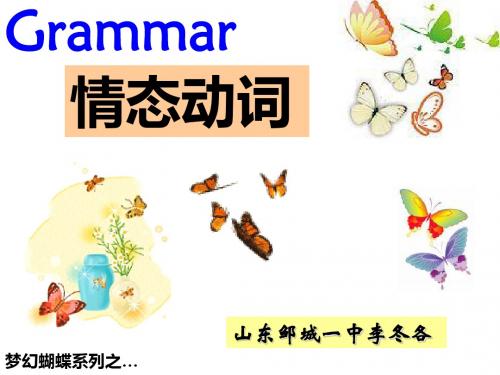
D. __非__得__,__应__要__________
-- May I smoke here? -- If you ____, choose a seat in the smoking
section. A.should B. could C. may D. must
B.John, look at the time. ____ you play the C.piano at such a late hour? D.A. Must B. Can C. May D. Need
B. could可代替can表示请求, 语气委婉
eg. Could you lend me your dictionary? Could I use your bike?
3) can’t /couldn’t have done 过否猜
eg. They can't /couldn’t have gone out because the light is still on.
• C. _表___请__求__或__许__可____:
eg. Can I sit here? Can I leave now?
-- Can I use your bike tomorrow morning? -- Yes, you can.
can 的用法: A. 表示能力; B. 表推测,可能性 C. 表请求或许可
must 的主要用法:
A. ___表__示___必__然___性__。__
eg: We must all die. 人总要死的。
B. _表___推___测__,___判__断___,__有___把___握的
He always comes first in exams. He must work very hard. You get the first prize, and you must be very happy now.
情态动词用法归纳(全)

They shouldn't have concealed it from us . 他们本不应该对我们隐瞒那件事。
当表示“经过努力才得以做成功某事”时应用be able to,不能用Can。如:
He was able to go to the party yesterday in spite of the heavy rain.
2)表示客观可能性(客观原因形成的能力)
eg. The moon can not always be at the full. 月不可能常圆 If it's raining tomorrow,the sports can take place indoors.
1. How dare you say I’m unfair? 2. He daren’t speak English before such a crowd, dare he? 3. If we dared not go there that day, we couldn’t get the beautiful
may(might)有以下几种形式:
时态 现在式 过去式
肯定式 may might
否定式 缩略否定式
may not
mayn't
might not mightn't
mቤተ መጻሕፍቲ ባይዱy(might)的基本用法:
1)表可能,暗含不确定,等于possibly,perhaps,maybe,如: He may be busy getting ready for his trip. 他也许在忙于准备外出旅游。
can 表可能时指现在或将来。如: You can perhaps obtain a dog from the Dog's home.
情态动词全部知识点总结
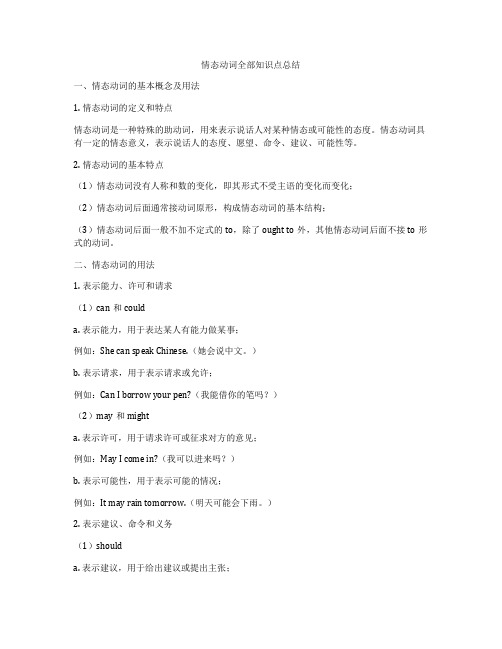
情态动词全部知识点总结一、情态动词的基本概念及用法1. 情态动词的定义和特点情态动词是一种特殊的助动词,用来表示说话人对某种情态或可能性的态度。
情态动词具有一定的情态意义,表示说话人的态度、愿望、命令、建议、可能性等。
2. 情态动词的基本特点(1)情态动词没有人称和数的变化,即其形式不受主语的变化而变化;(2)情态动词后面通常接动词原形,构成情态动词的基本结构;(3)情态动词后面一般不加不定式的to,除了ought to外,其他情态动词后面不接to形式的动词。
二、情态动词的用法1. 表示能力、许可和请求(1)can和coulda. 表示能力,用于表达某人有能力做某事;例如:She can speak Chinese.(她会说中文。
)b. 表示请求,用于表示请求或允许;例如:Can I borrow your pen?(我能借你的笔吗?)(2)may和mighta. 表示许可,用于请求许可或征求对方的意见;例如:May I come in?(我可以进来吗?)b. 表示可能性,用于表示可能的情况;例如:It may rain tomorrow.(明天可能会下雨。
)2. 表示建议、命令和义务(1)shoulda. 表示建议,用于给出建议或提出主张;例如:You should see a doctor.(你应该去看医生。
)b. 表示义务,用于表示责任或义务;例如:We should obey the law.(我们应该遵守法律。
)(2)ought toa. 表示责任或义务,用于表示应该做的事情;例如:You ought to apologize to her.(你应该向她道歉。
)3. 表示可能性和必然性(1)musta. 表示必然性,用于表示肯定的推断或必然的结论;例如:He must be at home now.(他现在一定在家。
)b. 表示义务,用于表示应遵守的规定或责任;例如:Students must wear school uniforms.(学生必须穿校服。
情态动词知识点大总结
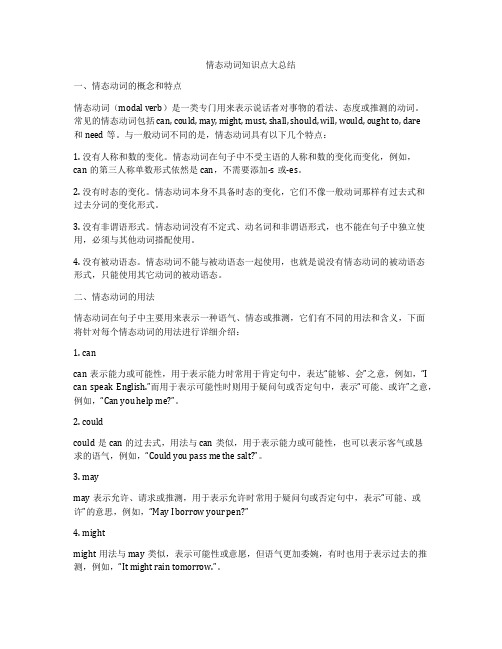
情态动词知识点大总结一、情态动词的概念和特点情态动词(modal verb)是一类专门用来表示说话者对事物的看法、态度或推测的动词。
常见的情态动词包括 can, could, may, might, must, shall, should, will, would, ought to, dare和need等。
与一般动词不同的是,情态动词具有以下几个特点:1. 没有人称和数的变化。
情态动词在句子中不受主语的人称和数的变化而变化,例如,can的第三人称单数形式依然是can,不需要添加-s或-es。
2. 没有时态的变化。
情态动词本身不具备时态的变化,它们不像一般动词那样有过去式和过去分词的变化形式。
3. 没有非谓语形式。
情态动词没有不定式、动名词和非谓语形式,也不能在句子中独立使用,必须与其他动词搭配使用。
4. 没有被动语态。
情态动词不能与被动语态一起使用,也就是说没有情态动词的被动语态形式,只能使用其它动词的被动语态。
二、情态动词的用法情态动词在句子中主要用来表示一种语气、情态或推测,它们有不同的用法和含义,下面将针对每个情态动词的用法进行详细介绍:1. cancan表示能力或可能性,用于表示能力时常用于肯定句中,表达“能够、会”之意,例如,“I can speak English.”而用于表示可能性时则用于疑问句或否定句中,表示“可能、或许”之意,例如,“Can you help me?”。
2. couldcould是can的过去式,用法与can类似,用于表示能力或可能性,也可以表示客气或恳求的语气,例如,“Could you pass me the salt?”。
3. maymay表示允许、请求或推测,用于表示允许时常用于疑问句或否定句中,表示“可能、或许”的意思,例如,“May I borrow your pen?”4. mightmight用法与may类似,表示可能性或意愿,但语气更加委婉,有时也用于表示过去的推测,例如,“It might rain tomorrow.”。
- 1、下载文档前请自行甄别文档内容的完整性,平台不提供额外的编辑、内容补充、找答案等附加服务。
- 2、"仅部分预览"的文档,不可在线预览部分如存在完整性等问题,可反馈申请退款(可完整预览的文档不适用该条件!)。
- 3、如文档侵犯您的权益,请联系客服反馈,我们会尽快为您处理(人工客服工作时间:9:00-18:30)。
情态动词1. 情态动词的推测表达2. 情态动词表达虚拟语气3. 某些情态动词的特殊用法一、知识重点与难点总结知识重点:情态动词在表达推测意义的句子中的运用:(一)用情态动词表达事实的推测。
can ,could ,might ,may,must 可以用来表达对事实的推测。
根据说话人对事实的把握性大小,must 表示“肯定⋯,”may / might / can / could 表示“可能⋯⋯,”must 只用于肯定句中,may / might 的否定式may not / might not 表示“可能不⋯⋯”, 而can / could 可以用于疑问句,表示“可能,可能⋯⋯吗?”,其否定式can't / couldn '表t示“不可能。
”用情态动词可以对现在或过去的事实进行推测。
对不同的时间内容推测有不同的结构。
(二)对现在的事实进行推测:主要结构:⋯must / may / might + 动词原形be+名词/形容词/介词短语be + doing例句:1. You must be Jeanne. I ' m Mathilde Loisel. We used to know each other very well.2. They must be in bed already at this time of the night.3. The teacher must be joking.4. Freda isn ' t in class. Sheu smt be sick.5. There must be something wrong.6. She might be very clever, but she hasn ' t got much common sense.7. He may be arriving this evening.8. He may be traveling around the world.9. The keys can ' t be in the room. I have just searched it very carefully.10. Can the news be true?(三)对过去的事实进行推测:结构:情态动词+have done / been+ 名词/形容词/介词短语例句:1. Mrs. Longmans must have been a pretty girl in her youth.2. He couldn 't have seen Anna yesterday. She ' s gone abroad.3. I think I must have left my glasses in the library.4. He might have overslept again.5. Where can Tom have gone ?情态动词表达虚拟语气:表达“本来⋯”,“不然早就⋯”。
这是情态动词的一种虚拟语气用法。
表示说话人所讲的与所发生的事实相反。
表达了说话人的埋怨,后悔的语气。
其结构是在一些情态动词后面加have done 结构。
根据要表达的意思,有如下结构:should have done / ought to have done :本应该⋯⋯shouldn 't have done / oughtn ' t to have done :本不该⋯⋯could have done :本来可以⋯⋯needn' t have done :本来没必要⋯⋯would like to have done :本来很想⋯⋯would rather not have done: 本来不愿意⋯⋯could / might / have done: 不然早就⋯⋯例句:1. You shoul dn' t have laughed at his mistakes.2. You could have told us earlier.3. I ought to have bought that dictionary last week.4. You ought not to have spent so much time in reading novels.5. We need not have been in a tearing hurry to catch the train.6. They would like to have seen that film last film.7. If he had given me his number, I could have telephoned him.8. They might have been frozen to death but for the rescue in time.知识难点:某些情态动词的特殊用法:need 和dare 的两种形式的用法need 和dare 可以用做实义动词,后面接不定式(to do )结构,在疑问句和否定句中,加助动词do/does/did/ 或don' t/doesn ' t/didn 't 。
作为情态动词使用时,主要用于疑问句和否定句中。
情态动词needn' t (没有必要,不必)相当于don't have to例句:1. It is cold, you need to wear some warm clothes.2. Need I stay here with you for a while? Thank you, you needn ' t.3. How dare you speak to parents like that?注意:句型I dare say+ 从句。
意思是:我肯定⋯⋯= I ' m s或ureThere is no doubt that+ 从句。
例句:I dare say that my uncle will get the money if I die.will 和would表示“意志”或“愿意w”o,uld 则指过去愿意做⋯⋯例句:1. He said that he would help us.2. You may telephone if you will accept this job.would 可以表达“过去习惯做⋯⋯”类似于“used to do ”例句:1. When we were children, we would go swimming every summer in that river. 表示请求,固定的句型:Will/Would you please do ⋯? / Would you like to do ⋯? 例句:Will/Would you please give him a message when you see him ?shall1. 用于第一,三人称,表示“请求”;“建议”或“推荐”例句:1. Shall we start the meeting now?2. Shall I watch TV now?3. Shall my son carry the case for you?2. 用于第二人称,表示“命令,“要求,”“许诺”例句:1. You shall take whatever you like.2. You shall not go to the party with me if you make so much noise again. 在表示推测的否定句或疑问句中,常用can /can 't /could / couldn '表t示,意思是:“可能⋯吗?”;“⋯不可能⋯”。
而不能使用mustn'或t must 等词。
【典型例题】1. —Do you think he will do me a favor ?—As far as I know, he is the last one to help others. He ____ be prepared to give you a hand,though.A. mightB. mustC. canD. should分析:本题考查情态动词推测性用法。
根据he is the last one to help others. (他是最不可能帮助别人的人),既然如此,那么“帮助你”的可能性也就最小了。
答案为A2. —Look, someone is coming. Guess who it ___ be ?—I think it ___ be Tom.—I don 't think it ___ be ____ .A. can ; must ; can ; heB. may ; can ; must ; himC. must ; can ; must ; hisD. might ; must ; can ; himself分析:根据备选答案。
can 表示推测时用于疑问句或否定句中。
本题首句就应该是Guess who can it be? 第二句应该是I think it must be Tom. (说话人十分肯定)。
第三句表达了说话人对前一个人的否定。
即:I don ' t think it can be him/he. (不可。
能答是案他为)A3. —Do you know Ms. Wang likes walking after supper ?—Sure. She ___ around the campus now.A. must be walkingB. must walkC. may walkD. may be walking分析:关键词Sure 告诉我们说话人的口气十分肯定。
根据句子语境:她此刻肯定正在校园散步呢must be doing 表示肯定正在做。
答案为A4. —I stayed at a hotel in New York.—Oh, did you ? You ____ with Barbara.A. could have stayedB. could stayC. would sayD. must have stayed 分析:首句说:我在纽约住在一家宾馆里。
在此 a hotel 是泛指。
所以 D 选项不合题意。
第二句在说:你本来可以和Barbara. 住在一起的。
Could have done 表示:本来可以。
